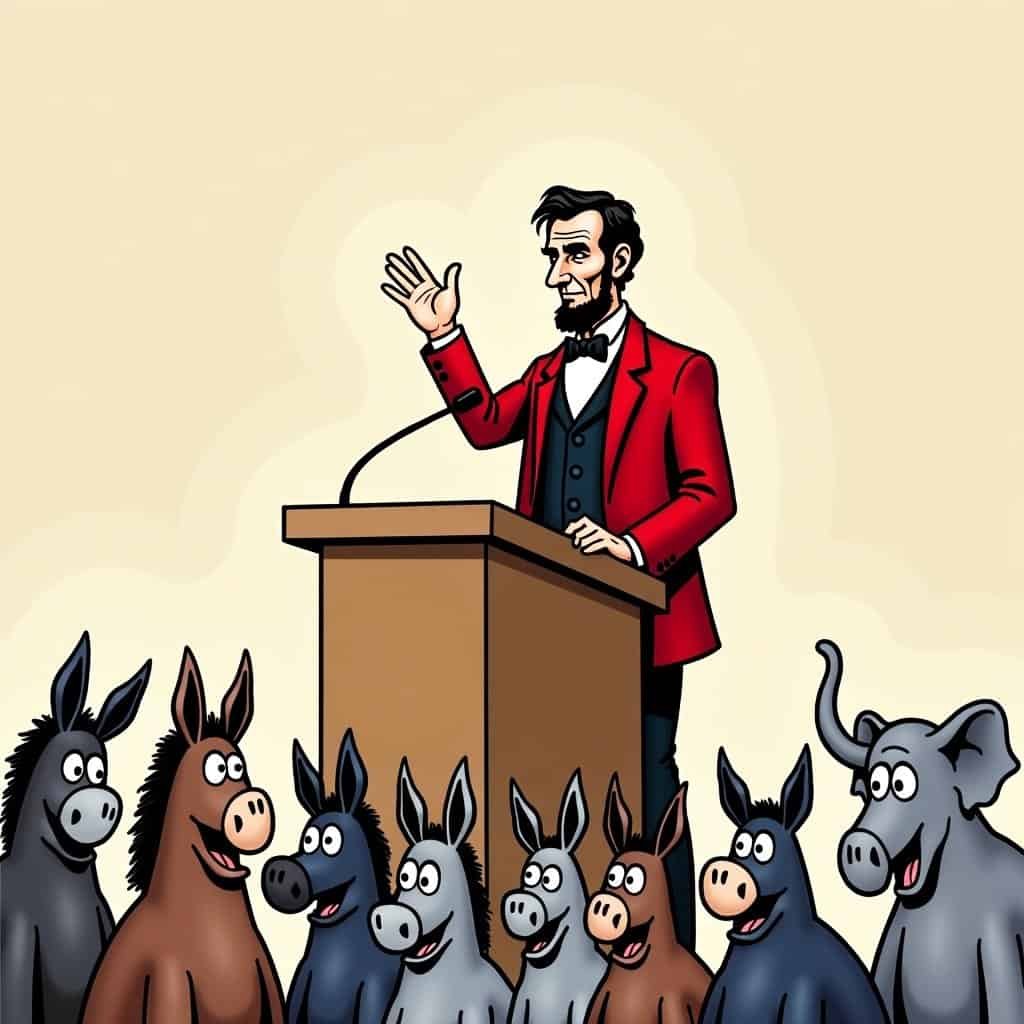Ah, Abraham Lincoln, the genius who wrangled Congress like a cat herder at a canine convention. His approach to Congress collaboration was less of a grand experiment and more of a whimsical balancing act. Today’s Republicans might want to take a few notes from Lincoln’s playbook – if they can find any pages left!
In Lincoln’s era, politics resembled the Wild West. You had your electrifying debates, high-stake votes, and, of course, lawmakers more divided than a Thanksgiving dinner at your in-laws when the turkey’s slightly dry. Yet, somehow Mr. Lincoln, the master persuader, convinced folks with more grit than a Fort Knox safe.
Lincoln’s Approach to Congressional Collaboration
Now, our Democrat friends might argue Lincoln was a wizard at waving the magical wand of government intervention, much like their current playbook. But let’s not kid ourselves; Lincoln’s toolbox of trade was conservative collaboration. His vision wasn’t about government doing the jig on every issue but about rallying resources—human and otherwise—for a greater cause: unity and prosperity.
While today’s progressive crowd might opt for the government riding in like a white knight on caffeinated horses to dole out solutions, Lincoln preferred a different beat. He was about equivalent opportunity, or in simpler terms, letting folks have a fair race without tying everybody’s shoelaces together. Some say this approach maintained a balance, propelled by the horsepower of hard work rather than government handouts—a philosophy still heartily toasted at Republican soirées today.
Lincoln’s Key Principles
- 🎯 Equivalent Opportunity: Fair chances for all
- 🤝 Conservative Collaboration: Working together without overreaching
- 🗽 Limited Government: Guiding, not governing
- 💼 Private Sector Innovation: Encouraging entrepreneurial spirit
The Emancipation Proclamation: A Bold Statement
Take Lincoln’s famous Emancipation Proclamation. Sure, it was a federal directive; yet, it was more a bold statement of moral clarity akin to cutting red tape while telling people to set down their baggage. Rather than a tome of regulation, it was a lightning bolt that inspired change from within—a lesson in motivation for today’s policy-writers bogged down by memos thicker than a black bear’s winter coat.
Managing Conflict: A Unifying Force
Then there’s the war Lincoln managed; he, unfortunately, had more conflict zones than a bickering toddler’s birthday party. But even there, he exemplified leadership as a unifying force, where he insisted upon the states’ rights alongside national unity—something today’s libertarians might tip their hat to, if they had one around.
Congressional Collaboration: Communication and Debate
His collaboration with Congress was paved on channels of communication and debate, not dictates. Republicans today could ponder Lincoln’s level-headed dealings when the government’s role was about defense and protection and less about handing out allowances more liberally than Aunt Betty at Christmas. And really, who could forget those spirited speeches—or Lincoln Moments, if you will—that left naysayers to rethink their Valentines for central government affection?
Lincoln’s Collaboration Strategy
| Aspect | Lincoln’s Approach |
|---|---|
| Communication | Open channels, frequent dialogues |
| Decision-making | Collaborative, not dictatorial |
| Leadership Style | Inspirational and persuasive |
| Policy Focus | National unity and prosperity |
Lincoln’s Legacy: Nurturing Shared Prosperity
Lincoln knew that the greatness of a nation stemmed not from a shelf-load of laws promising moonbeams and rainbows but by nurturing a society rooted in shared prosperity. When in doubt, guide not govern. Allow innovation to sprout in private sectors, let hard work shape futures, and leave room for rhinestones of risk to bedazzle paths forward.
Conclusion: A Timeless Tune
So to Lincoln and his way of Congress collaboration, let’s hoist our Union Jack-patterned flags high, and perhaps pencil in a reminder: “It’s easier to mend fences than to rebuild fortresses.” In keeping balance and freeing entrepreneurial spirit, Old Honest Abe’s methods resonate still, a timeless tune to Republican ears. Stick that in your Lincoln Log and build something grand!
Like Abe always intended, maintaining national integrity is not a check-in to Big Government Inn, but a featherlight tango over classical principles and modern practice. Bravo, Mr. Lincoln—let’s keep dancing.
Table of Contents
- Lincoln’s Approach to Congressional Collaboration
- The Emancipation Proclamation: A Bold Statement
- Managing Conflict: A Unifying Force
- Congressional Collaboration: Communication and Debate
- Lincoln’s Legacy: Nurturing Shared Prosperity
- Conclusion: A Timeless Tune






